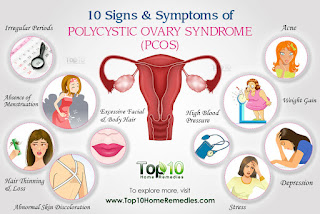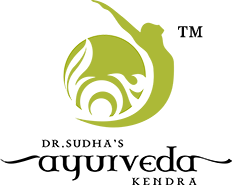
Polycystic Ovary Syndrome (PCOS)
It is a very common female health complaint due to hormonal imbalance after maturity. The word “syndrome” describes, it is a complex manifestation involving many factors such as obesity, insulin resistance, irregular menstrual bleeding, acne, unwanted hair growth (hirsuitism), excessive hair fall, lack of ovum production leading to infertility. PCOS often affects several family members and is aggravated by obesity.
The ovaries, where a woman’s eggs are produced, have tiny fluid-filled sacs called follicles. As the egg grows, the follicle builds up fluid. When the egg matures, the follicle breaks open, the egg is released, and the egg travels through the Fallopian tube to the endometrium of the uterus (womb) for fertilization. This is called ovulation. In PCOS condition, the follicles may start to grow and build up fluid but the release of ovum does not occur. The follicles in turn develop into a cyst.
The pituitary gland in our brain makes the hormones LH (Luteinizing Hormone) and FSH (Follicle Stimulating Hormone). After getting the signal from the hormones LH and FSH, ovaries make estrogen and progesterone, female sex hormones, a little bit of the androgen testosterone, a male sex hormone. In PCOS, male hormone testosterone will be produced in a large amount which affects the ovulation, which in turn leads to symptoms like acne, abnormal hair growth, excessive hair fall, infertility etc. High levels of insulin are produced in this condition which leads to the production of more testosterone, which blocks the release of ovum from follicle.
When the menstrual cycle starts, the brain sends LH and FSH to the ovaries. An acute rise of LH is the signal that causes the ovaries to ovulate or release an egg. The egg travels down through Fallopian tube into the uterus. Progesterone secreted from the ovary causes the thickening of the lining of the uterus. The egg is prepared for fertilization with the sperm. If the fertilization doesn’t occurs, the egg along with endometrium lining shed off through vagina. This is the menstrual period. This cycle repeats again every month after the completion of menstrual periods. In PCOS condition, the LH levels is too high. Because of that, LH surge will not be there and ovulation doesn’t occur, periods becomes irregular. Girls with PCOS may not ovulate which in turn leads to infertility.
Do’S
- Take adequate quantity of water.
- Include more vegetables and fruits in your diet.
- Take fiber rich diets.
- Include protein rich diet like pulses, lentils, nuts, etc.
- Practice regular exercise.
Don’ts
- Should avoid oily, spicy, fried foods, junk foods.
- Sugar and Confectionery.
- Sedentary life style.
- Avoid non-veg like chicken, red meat etc.
- Stressful life style.
- Over Weight- In obese condition, insulin resistance will be high there by increases the level of insulin in blood, which in turn increases the androgen production.
- Day time sleep.
In modern medicine, the treatment is symptomatic. They prescribe birth control pills which can cause side effects like weight gain, delay of pregnancy, etc. Steroids, which suppress increased adrenal androgen production can cause other diseases like Cushing’s syndrome, hypertension, increased risk of breast and endometrial carcinoma, etc.
According to Ayurveda, vata, pitta, kapha (Tridoshas) are vitiated which in turn vitiates mamsa (tissue), Shonita (blood) and meda (fat) producing inflammatory swelling called ‘Granthi’, referring to the cyst. Here apana vata (one of the 5 types of vata, it controls all the activities of lower abdomen) is mostly affected. We, thus have to focus on regulation of apana vata. If vata dosha is predominant, then symptoms like painful menses, severe menstrual irregularity, low weight occur. If pitta is predominant, symptoms like hair loss, acne, painful menses, clots, heart problems, burning sensation etc. occur.
If kapha is predominant, symptoms like weight gain, infertility, hirsutism (increased hair growth), insulin resistance etc. can happen
Management:
- Detoxification of body.
- Strengthening and revitalizing the female reproductive system and regularizing menstrual cycles, hormonal imbalance, weight reduction in obese women.
Medicines:
Sukumaram Kashayam, Varanadi Kashayam, Musalikhadiradi Kashayam, Asokarishtam, Kumaryasavam, Kanchanara Guggulu, Satavari Gulam, Kalyanaka Ghrita etc. are given according to the condition of the patients.
Panchkarma Treatments
Pizhichil, Swedana, Vasthi, etc. are treatments given in these condition. Among these Uttara Vasthi is very effective.
In vata predominant conditions, Pizhichil, Swedanam, Elakizhi, Sneha Vasthi, Kashaya Vasthi, Uttara Vasthi etc. are given.
In Pitta predominant conditions, Pizhichil, Swedanam, Elakizhi, Sneha Vasthi, Kashaya Vasthi, Uttara Vasthi, Virechanam etc. are given.
In kapha predominant conditions, Pizhichil, Swedanam, Elakizhi, Sneha Vasthi, Kashaya Vasti, Uttara Vasti, Virechanam, Udwartanam etc. are given.

